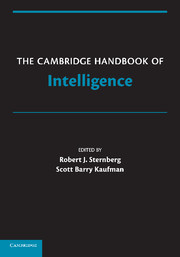Book contents
- The Cambridge Handbook of Intelligence
- The Cambridge Handbook of Intelligence
- Copyright page
- Dedication
- Contents
- Contributors
- Preface
- Part I Intelligence and Its Measurement
- Part II Development of Intelligence
- Part III Intelligence and Group Differences
- Part IV Biology of Intelligence
- Part V Intelligence and Information Processing
- Part VI Kinds of Intelligence
- Chapter 24 The Theory of Multiple Intelligences
- Chapter 25 The Theory of Successful Intelligence
- Chapter 26 Emotional Intelligence
- Chapter 27 Practical Intelligence
- Chapter 28 Social Intelligence
- Chapter 29 Cultural Intelligence
- Chapter 30 Mating Intelligence
- Part VII Intelligence and Society
- Part VIII Intelligence in Relation to Allied Constructs
- Part IX Moving Forward
- Author Index
- Subject Index
Chapter 24 - The Theory of Multiple Intelligences
from Part VI - Kinds of Intelligence
Published online by Cambridge University Press: 05 June 2012
- The Cambridge Handbook of Intelligence
- The Cambridge Handbook of Intelligence
- Copyright page
- Dedication
- Contents
- Contributors
- Preface
- Part I Intelligence and Its Measurement
- Part II Development of Intelligence
- Part III Intelligence and Group Differences
- Part IV Biology of Intelligence
- Part V Intelligence and Information Processing
- Part VI Kinds of Intelligence
- Chapter 24 The Theory of Multiple Intelligences
- Chapter 25 The Theory of Successful Intelligence
- Chapter 26 Emotional Intelligence
- Chapter 27 Practical Intelligence
- Chapter 28 Social Intelligence
- Chapter 29 Cultural Intelligence
- Chapter 30 Mating Intelligence
- Part VII Intelligence and Society
- Part VIII Intelligence in Relation to Allied Constructs
- Part IX Moving Forward
- Author Index
- Subject Index
Summary
- Type
- Chapter
- Information
- The Cambridge Handbook of Intelligence , pp. 485 - 503Publisher: Cambridge University PressPrint publication year: 2011
- 79
- Cited by

